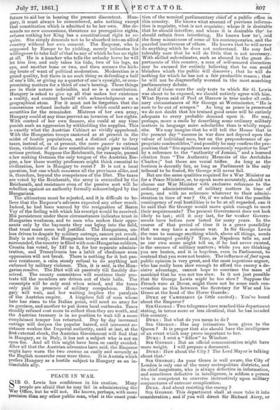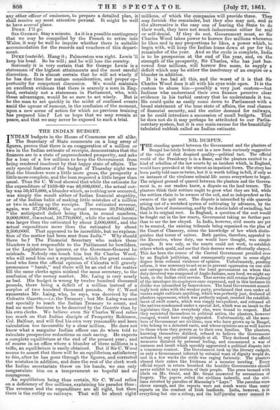PEACE IN' WAR.
SIR G. Lewis has confidence in his caution. Many people are afraid that he may fail in administering the -War Office, but he will not. He knows, perhaps, with more precision than any other public man, what is the exact pod- tion of the nominal parliamentary chief of a public office in this country. He knows what amount of previous informa- tion is requisite, what is not requisite ; where it is desirable that he should interfere, and where it is desirable thy he should refrain from interfering. He knows how to ioid that he should interfere, and where it is desirable thy he should refrain from interfering. He knows how to ioid the fussy minuteness of some of his contemporaries, and the puzzled inactiveness of others. He knows that he will never do anything which he does not understand. He may feel tolerably sure that he will do little that is not necessary. With skilled subordinates, such as abound in the great de- partments of this country, a man of self-assured discretion may be excused for entirely believing that he can avoid blunders which the public will discover ; that he will do nothing for which he has not a fair producible reason ; that he will not be disgracefully worsted in the most searching parliamentary debate. And if these were the only tests to which Sir G. Lewis was about to be exposed, we should entirely agree with him.
What Byron said of Peel at Harrow is true under all ordi- nary circumstances of Sir George at Westminster, "He is sure to be out of scrapes." As long as peace is preserved we do not doubt that his trained good sense will be entirely adequate to every probable demand upon it. He may, perhaps, move a smile by describing some ordinary military matters in language more scholarlike than is wholly requi- site. We may imagine that he will tell the House that in the present day "success in war does not depend upon the valour of individual men, but on the preponderance of ap- propriate combustibles," and possibly he may confirm the pro- position that "five squadrons are commonly superior to four" by a reference to the "authority of Jommi," and a learned citation from "The Authentic Memoirs of the Archduke Charles ;" but these are venial trifles. As long as the horizon is decently fair, as long as Parliament is the only tribunal to be feared, Sir George will never fail.
But are the same qualities required for a War Minister as for a Peace Minister, or, to speak more accurately, should we choose our War Minister with exclusive reference to the ordinary administration of military matters in time of peace, and with no reference whatever to their admini- stration in time of war ? Or, if we admit that the possible contingency of real hostilities is to be at all regarded, can it be said that Sir George would move quick enough to meet their requirements? The present Government does not look likely to last; still it may last, for far weaker Govern- ments have before now lasted for many years. In the course of that period of time it is a grave possibility that we may have a serious war. Is Sir George Lewis the man to manage anything which, above all things, needs to be managed quickly? Time, as Napoleon tells us, and as our own sense might tell us, if he had never existed, is the essence of military matters ; while you are thinking you are beaten, and it is hopeless, even in Parliament, to contend that you were not beaten. The influence of/act upon public opinion is very great, and the most ingenious arguer, who has really been slow enough to afford the enemy a de- cisive advantage, cannot hope to convince the DUN of mankind that he was not too slow. Is it not just possible that Sir George Lewis might be too slow ? Suppose the French were at Dover, might there not be some such con- versation as this between the Secretary for War and his Grace at the head of the Horse Guards : DUKE or CAMBRIDGE (a little excited): You've heard about the Emperor ? SIR GEORGE : Two telegrams have reached this department stating, in terms more or less identical, that he has invaded this country.
DUKE : But what do you mean to do ? Sin GEORGE: Has any intimation been given to the Queen ? It is proper that she should have the intelligence of an event which may prove important to her.
DUKE: I sent a "fellow" to Windsor.
Sin GEORGE: But an official communication might have more weight. I will prepare a document. Buns: How about the City ? The Lord Mayor is talking about that.'
SIR Groner; As your Grace is well aware, the City of London is only one of the many metropolitan districts, and its chief magistrate, who is always defective in information, and sometimes defective in intelligence, is seldom a person who is competent to converse instructively upon military conjunctures of extreme complication. Dune. And about resisting the enemy ?
Sin GEORGE. This department shall at once take it into consideration ; and if you will direct Sir Richard Airey, or any other officer of eminence, to prepare a detailed plan, it shall receive my most attentive perusal. It might be well to have several clans. DMEE. I'll go.
SIR GEORGE. Stay a minute. As it is a possible contingency that we may be compelled by the French to retire into Wales, it may be well to inquire whether there is suitable accommodation for the records and vouchers of this depart- ment.
Duira (outside). Hang it; Palmerston was right. Lewis keep his bead. So he will ; and he will lose the country. Seriously it is very certain that Sir George Lewis is a statesman of the highest attainments and the most careful discretion. It is almost certain that he will act wisely if he has due time for mature consideration, and proper op- portunity for competent discussion. We would maintain on excellent evidence that there is scarcely a man in Eng- land, certainly not a statesman in Parliament, who, with these advantages, would be so sure to act wisely. But is he the man to act quickly in the midst of confused events amid the uproar of rumour, in the confusion of the moment, upon a new scene of action for which no previous training haa prepared him ? Let us hope that we may remain at peace, and that we may never be exposed to such a trial.































 Previous page
Previous page